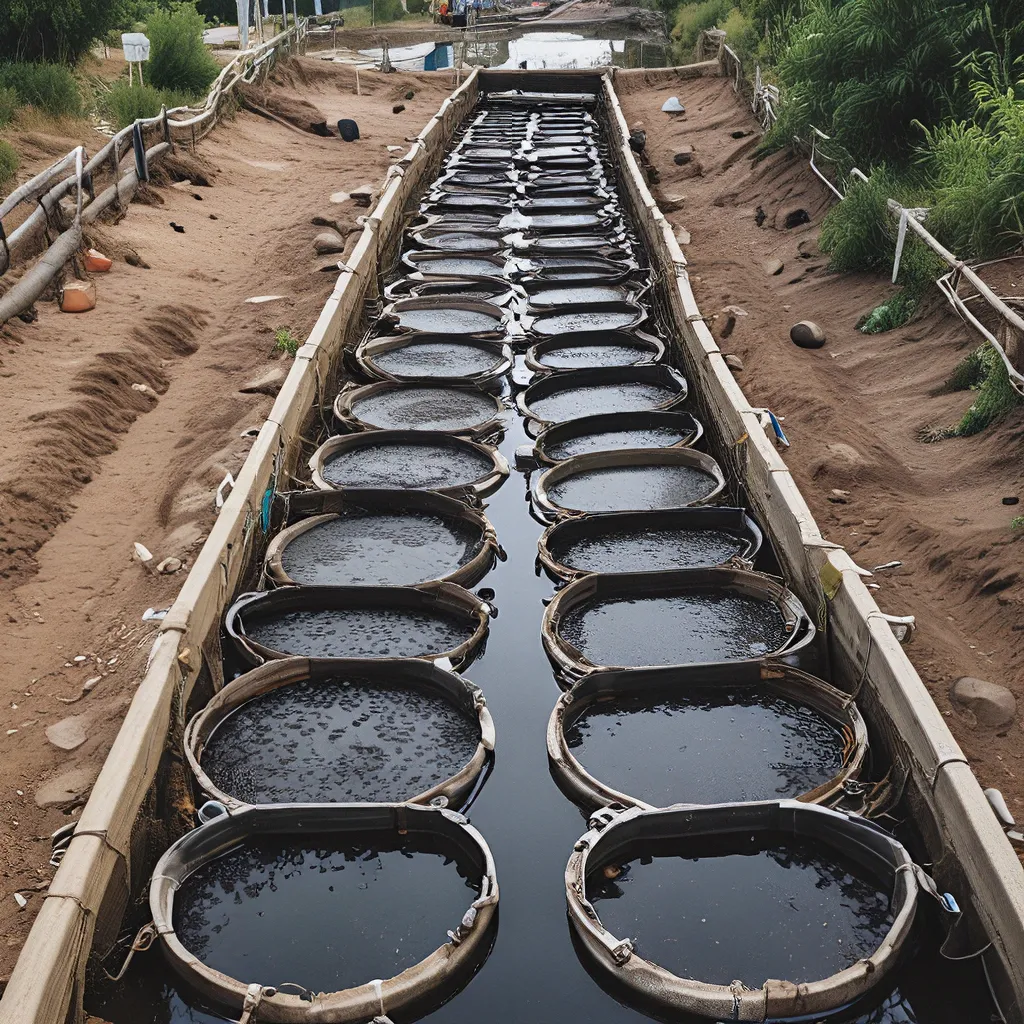
As an avid environmentalist and someone who’s always on the lookout for the latest innovations, I’ve been fascinated by the concept of the circular economy and how it’s shaking up the wastewater treatment industry. You see, for too long, we’ve been stuck in a linear “take-make-waste” model when it comes to managing our resources. But now, thanks to the principles of the circular economy, we have the opportunity to eliminate waste and pollution, circulate products and materials at their highest value, and regenerate nature – all while providing essential wastewater services.
It all started when I stumbled upon an intriguing article that explored the potential of new service models in the wastewater treatment sector. The researchers highlighted how the circular economy’s focus on sharing, leasing, reusing, repairing, refurbishing, and recycling could transform the way we approach wastewater management.
Intrigued, I dove deeper into the topic, and let me tell you, the possibilities are truly exciting. Imagine a future where wastewater treatment plants don’t just clean the water, but also recover valuable resources like nutrients, energy, and even rare earth metals. Or picture a scenario where homeowners and businesses become active participants in the wastewater treatment process, sharing infrastructure and assets to maximize efficiency and minimize waste.
The Circular Economy: A Systems Solution for Wastewater Management
At its core, the circular economy is a systems-level approach to tackling global challenges like climate change, biodiversity loss, and resource depletion. Instead of the traditional linear model, the circular economy envisions a resilient, regenerative system where waste is eliminated, resources are circulated, and nature is regenerated.
When it comes to wastewater treatment, this shift in mindset is absolutely crucial. The conventional wastewater treatment process is typically energy-intensive, resource-heavy, and often results in the release of pollutants back into the environment. But by applying the principles of the circular economy, we can transform this linear system into a closed-loop, sustainable solution.
Recovering Resources from Wastewater: A Treasure Trove of Opportunities
One of the most exciting aspects of the circular economy’s impact on wastewater treatment is the potential to recover valuable resources. Think about it – our wastewater is more than just dirty water; it’s a veritable treasure trove of nutrients, energy, and even rare earth metals.
Research has shown that wastewater can be a source of phosphorus, nitrogen, and other essential nutrients that are critical for agriculture and food production. By extracting and recycling these nutrients, we can reduce the need for energy-intensive and environmentally-damaging synthetic fertilizers, while also closing the nutrient loop and regenerating the natural ecosystem.
But the potential for resource recovery doesn’t stop there. Wastewater also contains organic matter that can be converted into biogas, a renewable energy source that can be used to power treatment plants or even be fed back into the grid. And emerging technologies are even recovering rare earth metals like lithium, cobalt, and neodymium from wastewater – elements that are essential for modern electronics and renewable energy technologies**.
Sharing Economy Solutions for Wastewater Treatment
As exciting as the resource recovery potential is, the circular economy’s impact on wastewater treatment goes far beyond just recycling. The sharing economy – a key component of the circular model – is also poised to transform the industry in fascinating ways.
Imagine a scenario where homeowners and businesses collaborate to share wastewater treatment infrastructure and assets. Instead of each property having its own individual system, they could pool their resources and share a centralized facility, reducing the overall cost and environmental impact. This collaborative, decentralized approach could also increase resilience and adaptability in the face of changing demands or extreme weather events.
The Ellen MacArthur Foundation has already identified several exciting business models that exemplify this sharing economy approach to wastewater treatment. For example, there are companies that offer ‘wastewater-as-a-service’, where they own and maintain the treatment infrastructure, while customers pay a subscription fee to access the service. This shifts the focus from asset ownership to service provision, incentivizing the provider to maximize the lifespan and utilization of the equipment.
Another innovative model is the ‘water utility-as-a-service’ approach, where a single utility manages the entire water cycle – from water supply to wastewater treatment and resource recovery – on behalf of multiple customers. This integrated, collaborative system not only improves efficiency but also aligns the utility’s incentives with the principles of the circular economy.
Overcoming Challenges and Embracing the Future of Wastewater Treatment
Of course, transitioning to a circular, sharing-based model for wastewater treatment is not without its challenges. There are technical, regulatory, and cultural barriers that need to be addressed, and the pace of change in this industry can sometimes feel glacial.
But I believe that with the right innovative mindset, collaborative spirit, and systems-level thinking, we can overcome these obstacles and unlock the full potential of the circular economy in wastewater management.
Alpha Wastewater, for example, is a company that’s already blazing the trail with its cutting-edge treatment technologies and pioneering service models. By embracing the principles of the circular economy, they’re redefining what’s possible in the industry and inspiring others to follow suit.
As I continue to explore this fascinating topic, I’m struck by the sense of possibility and optimism that the circular economy brings to the wastewater treatment sector. It’s a paradigm shift that not only benefits the environment, but also creates new economic opportunities and fosters resilient, collaborative communities.
So, who’s ready to dive in and be a part of this wastewater revolution? The future is bright, my friends, and it’s time to rethink the way we manage our most precious resource.